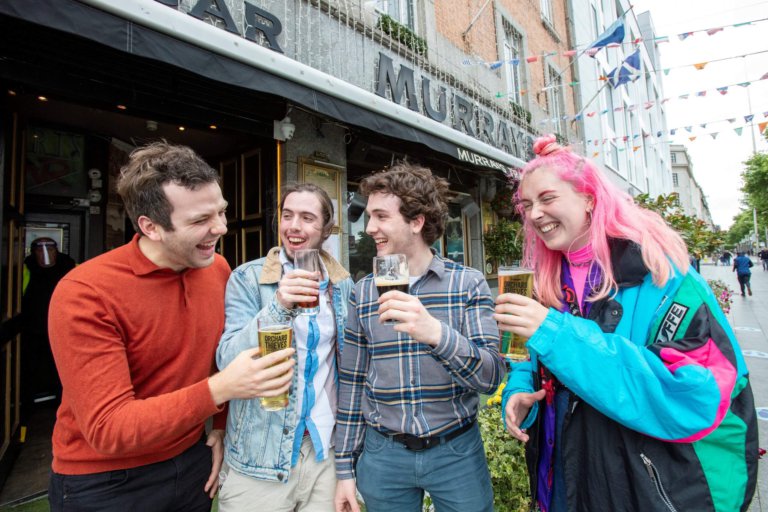
Ireland is a popular choice for international students for its rich heritage, fantastic higher education institutes, reasonable tuition fees and a number of other elusive factors.
A new study by the European Migration Network, titled Attracting and Retaining International Students’ recently revealed that “Immigration of non-EEA nationals for the purposes of higher education in Ireland grew by 45 per cent between 2013 and 2017,” meaning international student enrolment is at an all-time high in the country.
The number of international students coming to Ireland increased by 45 per cent between 2013 and 2017, according to a new report from the ESRI.https://t.co/hBFyr0NCcq
— The Irish Times (@IrishTimes) May 21, 2019
With the UK just a stone’s throw away and the rest of Europe at your feet, Ireland is undoubtedly set in a stunning, well-connected part of the world.
How will I be received?
Ireland used to be a very secluded country with a strong national identity. Fast-forward to 2019 and, while maintaining the same unique persona, Ireland is a much more multicultural country with citizens from the EU, Africa, Asia and elsewhere living alongside the natives.
Now, 12 percent of the population is made up of citizens from countries outside of Ireland, according to the Irish Times.
The Irish are famously friendly and, on the whole, warmly welcome foreigners. Irishmen and women have travelled for centuries, seeking out their fortune in countries like the US and elsewhere around the globe so they understand the desire to travel and what it means to build a better future for yourself away from your home country. Because of this, you will be treated with respect and welcomed in typical Irish style (warm smiles, ready for some fun!).
Many universities are working hard to ensure international students are integrated into university life and their new home in Ireland.
What are fees and living costs like?
Sadly, Ireland is not an overly cheap country to live and study in. According to the Irish Times, figures collected by student representation organisations and universities in Ireland estimated that it costs around €680 (US$800) a month to live in Ireland.
Add this to your rent costs of between €400 (US$470) and €800 (US$940) – or more – for shared accommodation monthly and you’re looking at well over 1000 dollars a month before you’ve even paid for health insurance or your tuition. However, costs can vary from city to city so you may be able to live in a cheaper location.
You will also need to purchase medical insurance which will set you back around €100 (US$120) for the year; however, there are concerns this could increase tenfold if new visa regulations are passed.
We are protesting the rising cost of education in Ireland.
We are focusing on the introduction of Supplemental Exam Fees, the rising cost of postgraduate and international fees, and the rising cost of student housing.#TakeBackTrinity #NotWindingDown pic.twitter.com/KuamxPppsM— TCD Students’ Union (@tcdsu) March 16, 2018
The government is considering changing visa rules so international students will have to take out full private medical insurance in order to retain their visa which can cost upwards of a grand, the Irish Times reported.
EU citizens coming to Ireland for their studies benefit from free tuition if they meet certain criteria, but if you are from outside the EU you will be subject to the cost of tuition.
Tuition fees vary from university to university and even course to course, so be sure to check university websites to find out the costs. To give you an idea, the fees are likely to be upwards of €10,000 (US$10,800) each year, although this can climb higher. A four-year international business degree, for example, can cost up to €18,700 (US$21,900) annually.
Where to study?
Ireland’s main universities are situated in Dublin, Galway, Cork, and Limerick and while each city is magnificently Irish, each has its own distinct identity.
Dublin
Ireland’s capital city, Dublin, boasts an extravagant and exciting lifestyle. It is a large city, bursting with life, with something always going on. With bustling Irish pubs and bars playing live music, a sandy beach for summer afternoons, museums and stunning architecture, there’s always something to be doing or somewhere to be going. We’d love to see you try and run out of things to do!
If it’s happening in Ireland, chances are it’s in Dublin.

It’s easy to fall in love with Dublin. Source: Shutterstock
Dublin is home to the majority of Ireland’s universities, so it will come as no surprise that it’s a very student-orientated city, geared up for letting students explore its beauty. It’s a diverse and multicultural destination that appeals to people from all walks of life.
But don’t forget that Dublin can be mighty pricey. It’s by far the most expensive city for accommodation in the country and even just a pint in a local pub can set you back a fair bit of cash!
Galway
Take it from the New York Times, Galway is “Ireland’s most charming city.” Not only is it small enough to happily stroll around, but it also bursts with quirky, well-loved independent shops and restaurants.
Galway is consistently voted in the top 10 friendliest cities in the world, and has even come top of the list in its time!

It’s not ALL happening in Dublin, why not consider Galway? Source: Shutterstock
But not only is it charming and friendly, but Galway is also widely known as a cultural hub, hosting world-class festivals, while birthing artists and performers who are known around the globe.
Can you picture yourself at the Galway International Arts Festival, or the Galway Film Fleadh? How about the Galway Races or even the Galway World Oyster Festival? And we haven’t even scratched the surface on the countless exciting events happening around the city every year.
The city has even been crowned the European Capital of Culture for 2020 so the whole continent knows how awesome Galway is.
Cork
Forget Dublin, say Cork-locals, this city is Ireland’s “real capital” city.
As the nation’s second-largest city – after Dublin, of course – Cork is known as Ireland’s “rebel city” for its liberal youth, lively nightlife and passionate locals. Mix this with traditional architecture that gives a quaint, old-town feel and you’re onto a winner! Expect 16th century churches and palaces just around the corner from hectic pubs, bustling restaurants and cafés.

We have to admit, it’s pretty beautiful in Cork. Source: Shutterstock
Cork is home to around 30,000 international students so you won’t be alone, and with such a large population of young adults, the city brims with interesting people from all over the world.
This place is geared up for a large student population, running numerous student nights all week and events all year round. You’ll likely be wishing for more time to experience all the things you want to do!
Limerick
If you’re hampering after a smaller Irish city with a hell of a lot of soul, look no further than Limerick. The city is buzzing with numerous festivals, a varied nightlife, and vibrant shopping and arts scenes. Think small-town feel with a big heart, mixed with all the comforts and excitement of modern city living!
If you’re a fan of the sport you’ll certainly love Limerick! Crowned the Ireland’s sporting capital, this city has a wealth of opportunities for athletes and sports fans alike, from Gaelic football, to golf, rugby to cycling and even hurling – Ireland’s national sport (if you’ve not seen it – look it up!). Sporty or not, you’re bound to have fun trying your hand (or foot) at the local games.
Want some time to unwind? You can discover Limerick’s laidback side while ambling beside the River Shannon, which winds its way through the middle of the university’s campus. Seek out medieval treasures like the walls of King John’s Castle or venture into the Hunt Museum for a fascinating collection of artefacts that date back to the Iron and Bronze Age.
Wherever you choose in Ireland, you’re bound to fall in love with the city, the country and its wonderful people.
Liked this? Then you’ll love…
Ireland races ahead as a popular international student destination in this new report
Ireland growing in popularity for English language education







